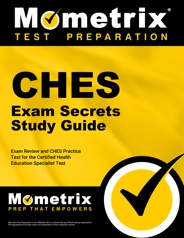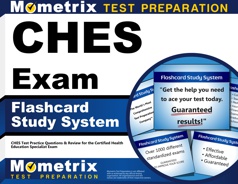
The Certified Health Education Specialist (CHES) exam was created by the National Commission for Health Education Credentialing (NCHEC) to measure knowledge in eight major subjects for health education specialists.
This page will cover the CHES exam, what information the examination covers, the number and type of questions you can expect, the score you need to pass, and everything you need to register for the assessment.
To be eligible to take the CHES exam, you must meet the first requirement listed below AND meet either requirement 2a or 2b:
1. You must have at least a bachelor’s degree from an accredited institution of higher education.
2a. You must have majored in health education.
2b. You must have obtained a minimum of 25 semester hours or 37 quarter hours of coursework that specifically covers the Eight Areas of Responsibility and Competency for Health Education Specialists.
The CHES exam contains 165 multiple-choice questions, 15 of which are unscored, and you will be given a time limit of 3 hours. The unscored questions, known as “pretest” questions, are used by the test administrators to evaluate questions for use on other versions of the exam.
The exam is split into eight areas of responsibility.
Check out Mometrix's CHES Study Guide
Get practice questions, video tutorials, and detailed study lessons

There is no set passing score for the CHES, meaning that the number of correct responses needed to obtain a passing score will vary slightly for each person. Your score is based on the Modified Angoff method, which means that your score is based entirely on your performance and is not based on how well other test-takers did.
Once you have completed the exam, your proctor will provide you with a score report that simply indicates “pass” or “fail” status, and may provide more detailed information about your scores per content category.
If you do not pass the exam on your first try, you are permitted to take the exam again, but you must wait until the next testing cycle. If you retake the exam during the next available testing cycle, you will be given the opportunity to pay a reduced exam fee.
Check out Mometrix's CHES Flashcards
Get complex subjects broken down into easily understandable concepts

Your success on CHES test day depends not only on how many hours you put into preparing but also on whether you prepared the right way. It’s good to check along the way to see whether your studying is paying off. One of the most effective ways to do this is by taking CHES practice tests to evaluate your progress. Practice tests are useful because they show exactly where you need to improve. Every time you take a free CHES exam practice test, pay special attention to these three groups of questions:
This will show you exactly what your weak areas are and where you need to devote more study time. Ask yourself why each of these questions gave you trouble. Was it because you didn’t understand the material? Was it because you didn’t remember the vocabulary? Do you need more repetitions on this type of question to build speed and confidence? Dig into those questions and figure out how you can strengthen your weak areas as you go back to review the material.
Additionally, many CHES practice tests have a section explaining the answer choices. It can be tempting to read the explanation and think that you now have a good understanding of the concept. However, an explanation likely only covers part of the question’s broader context. Even if the explanation makes sense, go back and investigate every concept related to the question until you’re positive you have a thorough understanding.
As you go along, keep in mind that the CHES practice test is just that: practice. Memorizing these questions and answers will not be very helpful on the actual test because it is unlikely to have any of the same exact questions. If you only know the right answers to the sample questions, you won’t be prepared for the real thing. Study the concepts until you understand them fully, and then you’ll be able to answer any question that shows up on the test.
When you’re ready to start taking practice tests, follow this strategy:
There are 165 multiple-choice questions on the CHES exam.